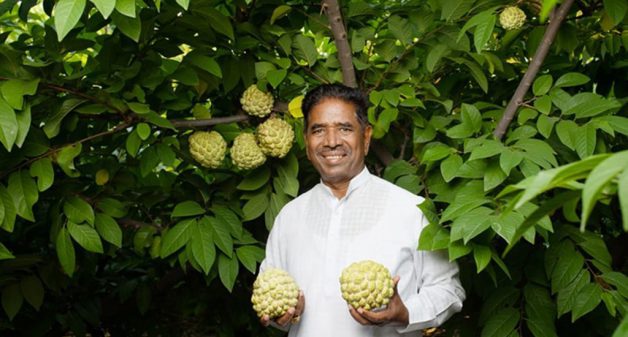
Ingenious farmers breed new fruit varieties
Ever wished you could have mangoes year round, custard apples with fewer seeds or jumbo grapes? Now you can, thanks to some innovative, self-taught famers.

Ever wished you could have mangoes year round, custard apples with fewer seeds or jumbo grapes? Now you can, thanks to some innovative, self-taught famers.
When you think of apples in India you think of Kashmir and Himachal Pradesh. Both are synonymous with apples, which need a temperate climate for its trees to blossom and bear fruit. You don’t think of India’s hot plains or tropical forests. But thanks to farming innovations, apples are now grown even in the hot climate of the plains.
Generally it is esteemed agricultural universities or institutions, like the Indian Institute of Horticultural Research, Central Institute of Subtropical Horticulture, never mind multinational corporations, which develop new varieties of crops or fruits.
But there are a growing number of ingenious farmers who – without any formal education – have developed new fruit varieties that are not only high-yielding and pest-resistant, but can be grown in a wide variety of environments. Imagine a three-season mango, an all-terrain apple, a custard apple with fewer seeds and a jumbo grape.
Growing apples in India’s plains
Nowadays apples are cultivated in Maharashtra, Telangana, Uttar Pradesh and Karnataka, states where they weren’t grown. This all-terrain apple variety HRMN-99 was developed by Hariman Sharma of Himachal Pradesh.
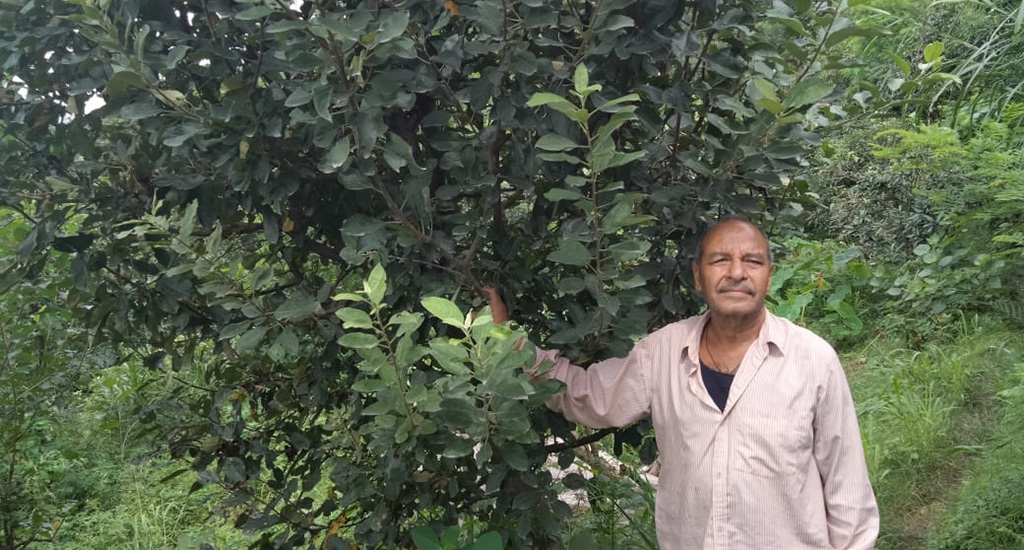
“Earlier, no one would have believed that apples would grow in the plains, 700 m above sea level in warm temperatures,” said Sharma, dwarfed by the fruit trees in his orchard-cum-nursery.
This variety is resistant to common diseases and can be grown in regions with temperatures of 40-45o C. So far, Sharma has distributed over 3 lakh saplings across the country.
“I’ve planted 15,000 apple saplings in 29 states with the sponsorship of National Innovation Foundation. In 15 states the trees have started bearing fruits,” Sharma said.
He also holds the Plant Breeders’ Rights that gives the breeder exclusive control over both propagating material, including seeds and cuttings, and harvested material, including cut flowers and fruits of a new variety.
Mangoes fruit throughout the year
Mango, the king of fruits, is one of India’s most popular summer fruits. But what if they were available in other seasons too? Shree Kishan Suman’s “Sadabahar” mango, grown in Rajasthan, is just that variety.
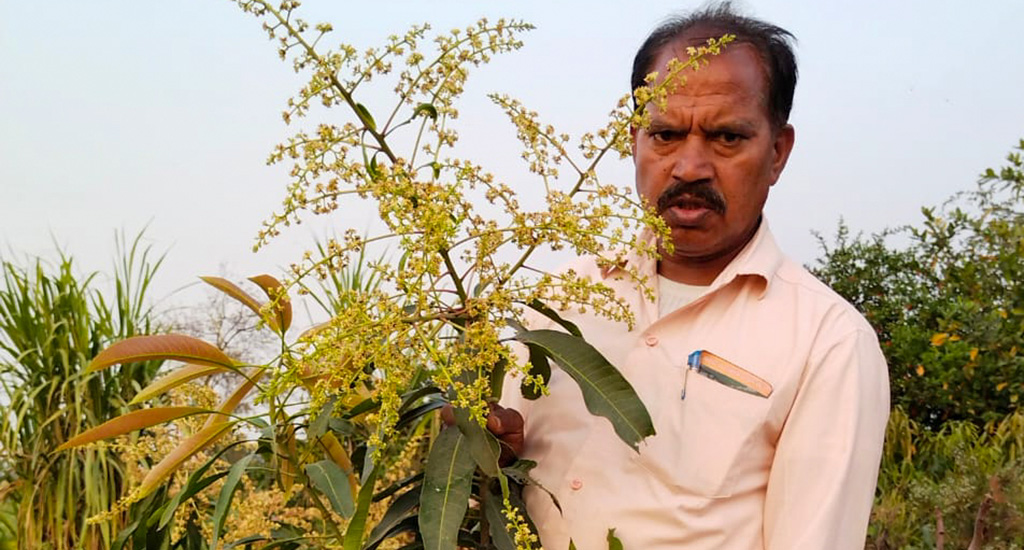
In 2000 Suman stumbled upon a mango tree in his family’s orchard that bloomed through three seasons, instead of the more common March to July season. Suman believes his Sadabahar mango is the only one in the world that fruits thrice a year. His mango variety, which is registered under the Protection of Plant Varieties and Farmers’ Rights Act (PPV & FR Act) as a farmer’s variety, is also immune to major diseases.
Being an off-season variety, Sadabahar has attracted the attention of national and international mango lovers who visit his farm.
“As there’s an increasing demand I have acquired additional land to grow more saplings,” said Suman, a recipient of the National Grassroots Innovation and Outstanding Traditional Knowledge award of the National Innovation Foundation – India (NIF), a government institution.
Make way for pulpier, yellow custard apples
In 2011 farmer-breeder Navnath Kaspate introduced the NMK-1 (Golden) custard apple variety, which has fewer seeds, more pulp and rarely cracks when ripe.
Months before the planting season of custard apple begins, Kaspate advertises in the local newspapers to attract wannabe growers. Hundreds of farmers visit his 14-acre custard apple nursery in Maharashtra. The farmers order saplings and attend a two-hour workshop that familiarizes them on the variety’s agronomic practices.
Mainly grown in dry-land zones, the yield of this golden-yellow skinned fruit can be as high as 12 tons per acre. The green variety yields 6 to 8 tons.
In 2015 Kaspate received the Plant Genome Savior Award from PPV&RA. He has sold 33 lakhs of saplings so far and earns around Rs 1 crore from the sale of fruit grown in his 40-acre farm.
Long grapes for raisins and export market
As grapes have more uses – from a healthy snack, to making wines and raisins – farmers in “the grape belt” of Maharashtra have developed around a dozen new varieties.
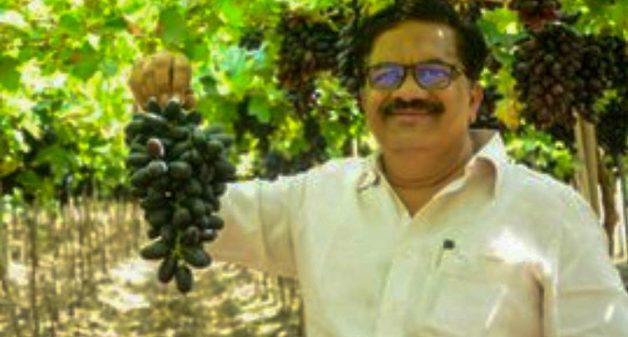
Dattaraya N Kale is a serial innovator with four varieties to his name. King Berry, his latest launched this February, is an elongated variety, around 45-50mm long, which he says are best turned into premium raisins.
While the India market has been growing, the export market is also strong.
“This variety can cater to new export markets like China, Hong Kong and Malaysia. It’s high yielding, weather-resistant and fetches higher prices,” said Kale, a recipient of Grass Root Innovation Award at Festival of Innovation and Entrepreneurship (FINE) 2019, that recognizes innovations of the common man.
Despite innovations, challenges remain
The term farmer-innovator is a recent coinage in India. Over the years NIF has identified, recognized and promoted innovators from small towns and villages.
“Following proper verification and validation by agriculture universities or the Indian Council of Agriculture Research (ICAR), we assist the innovators in acquiring registrations,” Hardev Choudhary, scientist at NIF – India, told VillageSquare.in.
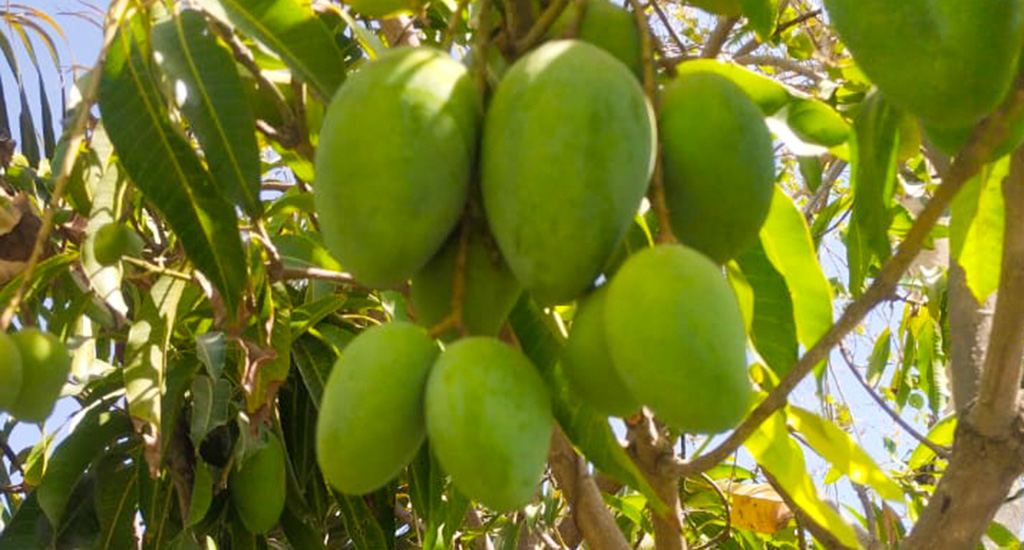
But like other innovations, farmer-innovators are also fighting a losing battle against counterfeits.
“It doesn’t bother us that these nurseries make money at our expense, but buyers are being cheated,” said Suman.
For instance, a grafted apple sapling from Sharma’s nursery costs Rs 80, while a counterfeit costs Rs 1,000.
“Duped people call me because non-grafted saplings are unlikely to fruit,” said Sharma.
Custard apple innovator Kaspate is among the few who have taken up a legal battle against duplicates. He has filed civil cases against 221 Maharashtra nursery owners engaged in selling counterfeits.
The farmer-breeder community eagerly awaits a favorable decision on Kaspate’s civil suit, as it would empower them to take on other counterfeiters.
Hiren Kumar Bose is a journalist based in Thane, Maharashtra. He doubles up as a weekend farmer. Views are personal.